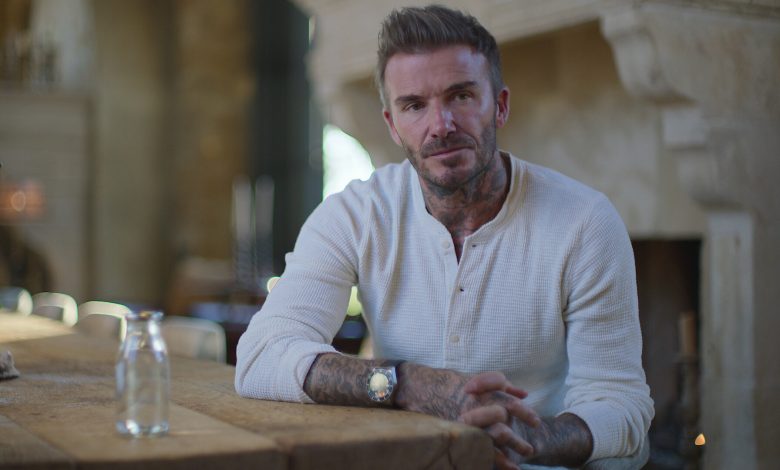Netflix’s Beckham is a Compelling Character Study of a Global Icon

Max Domel ‘26 / Emertainment Monthly Staff Writer
In recent years, Netflix has churned out a handful of limited series and feature-length documentaries on big-name soccer players, including Neymar Jr., Nicolas Anelka, and Pelé. But their new four-part docuseries, Beckham, directed by Fisher Stevens and produced by John Battsek, is their most profound and thrilling one yet. Through never-before-seen footage and interviews with old teammates, coaches, family, friends, and “Becks” himself, viewers are afforded a deeply intimate, powerful look into the storied and complex career of a global icon.
Over the course of his career, David Beckham remained a divisive figure. At times, tons of women sent him their clothes in the mail, but other times he was mailed bullets and death threats. He found himself applauded by tens of thousands in stadiums, but was also heavily booed and abused for months on end by packed crowds. He was adored by his coaches for his world-class talents and work ethic, but also regularly frustrated them with his stubbornness and flashy expressivity. He has always had a very loving relationship with his wife, Victoria (a.k.a. Posh Spice), but he made her consistently fed up with him for moving their family all over Europe. This is where the series truly excels in its storytelling, combining these interesting highs and lows and showing how he bounces back each time. In turn, this presents a multi-faceted construction of Beckham’s character that one can’t help but ultimately root for.
Each episode represents a phase of the development of the Beckham character. The first, “The Kick,” mainly covers how he was as a child and young adult, flourishing in youth soccer and eventually securing his role in England’s most prestigious team: Manchester United. Next, “Seeing Red,” follows him through his mid-20s as he faces the pressures and harsh realities of being a professional athlete and national celebrity. He becomes a regular on the England national team and fully emerges into the public eye through his dating life with Victoria. “Golden Balls” raises the tensions even higher with Beckham’s move to Spain to play for Real Madrid—arguably the world’s most prestigious club—where he and his family are met with difficult cultural changes and increasing hostility from the paparazzi. Lastly, “What Makes David Run” depicts him towards the tail-end of his glory days where he, chaotically, joins the L.A. Galaxy (a historic win for the reputation of soccer in America) and bounces between them and AC Milan in Italy, then retires at Paris Saint-Germain in France. Then the last twenty minutes or so shows his current lifestyle, peacefully living in the English countryside with his family.
Despite having to cover all of these events across Beckham’s career, though, the series manages to keep the pacing even throughout and delivers information in a very digestible manner. The four big chunks of the story are divided with precise execution and momentum is always building forwards. From a production standpoint, the series also provides consistent entertainment and energy. Each episode is filled to the brim with impressive amounts of archival footage that seemingly capture every moment and add a great sense of global stakes to the story. Music is implemented effectively to emphasize euphoric turning points in Beckham’s fortunes on and off the field. Most importantly, though, the production elements are packed with lots of raw emotion and vulnerability—which greatly adds to the success of the series’ main goal: giving Beckham his voice in the matters that he never had before and presenting the world with a more complete profile of him as a person through a humanistic lens. (One notably fascinating technique utilized by the filmmakers in this regard is the inclusion of closeup shots of interview subjects—Beckham, his parents, other former players—staring directly into camera while watching old game highlights with the footage fading over their faces, reflective of how the memories are washing over them.)
It would be easy to only view Beckham from the surface: good-looking, extremely wealthy, successful footballer, and known for involving himself in drama. But as the episodes unfold we see how these aspects made him an easy target for scapegoating and villainizing by the media. The series still shines a light on some of his character flaws—stubbornness, flashiness, occasional selfish decision making—but also illustrates all of his inherently good qualities that have continually overshadowed. His sheer determination and grit, pure talent, family-first values, deep humility, great sense of humor, and genuine respect for others. In interviews, he isn’t afraid to get emotional discussing old traumas and analyze his better and worse moments, providing for a powerful and intimate viewing experience.
Beckham is ultimately a compelling, multi-dimensional character study. The series is also an enlightening critique of both sports culture and popular culture. It is real and uplifting. It makes audiences feel every ounce of emotion that Beckham and all of the interviewees feel. It beautifully shows how Beckham and some of his former teammates and coaches have been able to resolve previous conflicts and falling outs—leaving plenty of space for their personalities to shine. We may end with the image of 48-year-old Beckham, tatted and suited up, president of Inter Miami CF (home of Lionel Messi), and a father of three grown-up children. But by the end audiences can’t help but see that innocent, little boy with just an immense love for soccer in him. Beckham is a rollercoaster and even for non-soccer fans, a ride definitely worth watching.